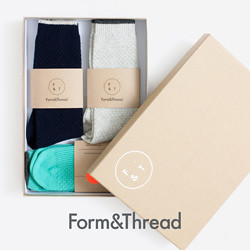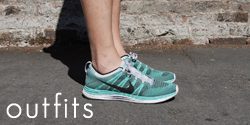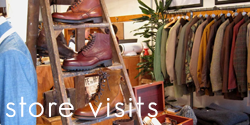
Being from Lancashire, I'm no stranger to wearing wool. It gets darn chilly from late October, from then on I can usually be found wearing several layers at once to combat frosbite, as well as keeping the old circulation condition at bay. You often that hear we love the Winter because "we get to cosy up in our favourite jumper, soft blanket and a mug of hot chocolate" - personally I never really find the time for that but I can't really imagine a freezing cold night without one of our most loved materials.
There's no doubt we take wool for granted–it's always been been in our lives–but when was the last time you actually thought about the lead-up process to what finally becomes "our favourite" jumper? Well, as your friendly roaming reporter I headed up to the top of Scotland to visit one of the oldest woollen manufactuers in the UK, Johnstons of Elgin.



For anyone who hasn't heard of Johnstons of Elgin, these guys are as old as the hills, with a well decorated history. Since 1797 they've been manufacturing some of the finest woollen products money can buy - the fact that their wool is still in such high demand hundreds of years on, is a testament to the company's quality and integrity. They also create products for some of the world's most established fashion houses. Johnstons clearly know the winning formula.
As we arrived at the grounds it quickly became clear that this was no ordinary factory–this was on another level from what I'd seen previously. The beautiful estate holds a museum dedicated to wool and its history, a spacious modern cafe, small food market, offices and of course, the engine room itself, the factory floor.



As we were shown around several rooms, our group instantly realised that there was much more to producing wool than we ever realised. Naivety on my part maybe, but like I said, most of us don't consider the labour that is necessary to produce something we see as any everyday commodity. The amount of stages each piece of fibre goes through before it starts to resemble a scarf, jumper or blanket were frankly breathtaking; with most of the stages being complete by hand or part-machine-part-hand. Luckily the night before we had a quick lesson in all things wool by the wonderful Sheila-Mary Carruthers of Woolmark!
Our tour of the mill took us through each stage of the production; the Wool Store, Dye House, Blending, Carding (for strengthening), Spinning, Warping and Finishing. I was a stranger to the majority of these terms before I arrived–and If I'm honest I wouldn't be able to do each of them justice–but the enthusiasm and passion behind each step presented to us left a lasting impression on how I look at the wool industry.
Johnstons of Elgin, still to this day is a family-run business, and we had the privilege to meet a handful of the team behind the brand–some who had been working there for the whole of their lives. I even meet the lady who designed my scarf! We gained an invaluable insight into the ins-and-outs of producing one of the world's most loved materials, the history of the company (through the extensive fabric/pattern archive and handwritten ledgers dating back hundreds of years) but also discovered their progressive nature - a willingness to innovate and refine.

There's strong argument as to why we've been using wool for thousands of years, mainly due it being one of the most sustainable fibres we know; 100% natural, renewable and biodegradable. Companies such as Johnstons are really trying to push the limits of wool, with even a mention of a Scandinavian company developing a more sustainable bicycle frame - containing woollen fibres, too reduce weight and use of man-made materials. Similarities can also be found within the world of cycling + fitness apparel, due to wool's cooling and heating qualities.
Producing and trading from our own shores (no matter which county) has a knock-on effect for our economy. It provides many jobs and helps to support our local and national community. It was a real eye-opener visiting the Johnstons of Elgin Mill, and no doubt will have a lasting affect on the way I look at one of our most loved materials.
It was a pleasure to meet the team behind the Campaign for Wool and the wonderful Sheila-Mary Carruthers of Woolmark.
Thanks for visiting,
Mat






























Sounds like a fun and interesting visit! I remember going something like that in South France five years ago and bought €50 scarf from there which I still wear to death especially over Christmas! It is 100% wool and feels lovely.
ReplyDeleteKatrina Sophia
Very cool photo tour! Wool is truly a gift from the gods
ReplyDeleteThis is really interesting! I wish I had more wool stuff, it's got so many good properties.
ReplyDeletevery very cool tour! i am not a fan of colder months but i love wool and wearing them! and developing a more sustainable bicycle frame using woollen fibers sounds so fascinating!
ReplyDeleteFascinating. I find processes so interesting especially when it comes to cloth. For the past few months wool in particular has piqued my interest. I want to make some garments with a soft soft soft wool that will guard me against the impending cold. A dress and a pair of short and Hiro wants a pair of trousers but finding wool off the roll that wont cost a small fortune has not been easy. So, thank you for bringing further into light this wonderful material and for bolstering my love for it.
ReplyDeleteThanks Vanessa, it was a pretty cool subject to cover.
ReplyDeleteIt was very interesting, an eye-opener for sure. I'm looking forward to getting the scarfs out.
ReplyDeleteI guess you guys don't need it too much? Those you have tones of it in New Zealand
ReplyDeleteWhat a cool experience! It's always an eyeopener to see the amount of work that goes into making things.
ReplyDeleteCheers Hollie, hopefully I can visit some more around the country.
ReplyDeleteI don't cope with the cooler months so well but hopefully wool can be my friend. I've got a circulation problem so anything helps really.
ReplyDeleteDo you think you could really make some trousers? It would be a challenge for sure, not the easiest of tasks. I imagine getting started would be tricky but you'd pick it up quite quickly. I've seen some blog from guys who make their own jeans before.
ReplyDeleteLovely photos! I really want to visit now :)
ReplyDeleteI will try with shorts first but I am quite confident that it will work. I just have to be careful with my cutting and may have to use far more bias tape that I am used to!
ReplyDeleteThis sounds amazing, I am always amazed by the amount of work that happens behind the scenes!
ReplyDeleteMaria xxx
It's open to the public!
ReplyDeleteI know, all the hard work gets forgotten about.
ReplyDeleteFantastic post - I love knowing all the details about how clothes are made. Great photos too!
ReplyDeleteElly
Hey Elly, it's been a while hey! Thanks for the feedback, glad you enjoyed it.
ReplyDeleteNo worries - yes I am a little bit of a lurker on blogs. Commenting is going to be my 2015 resolution!
ReplyDelete